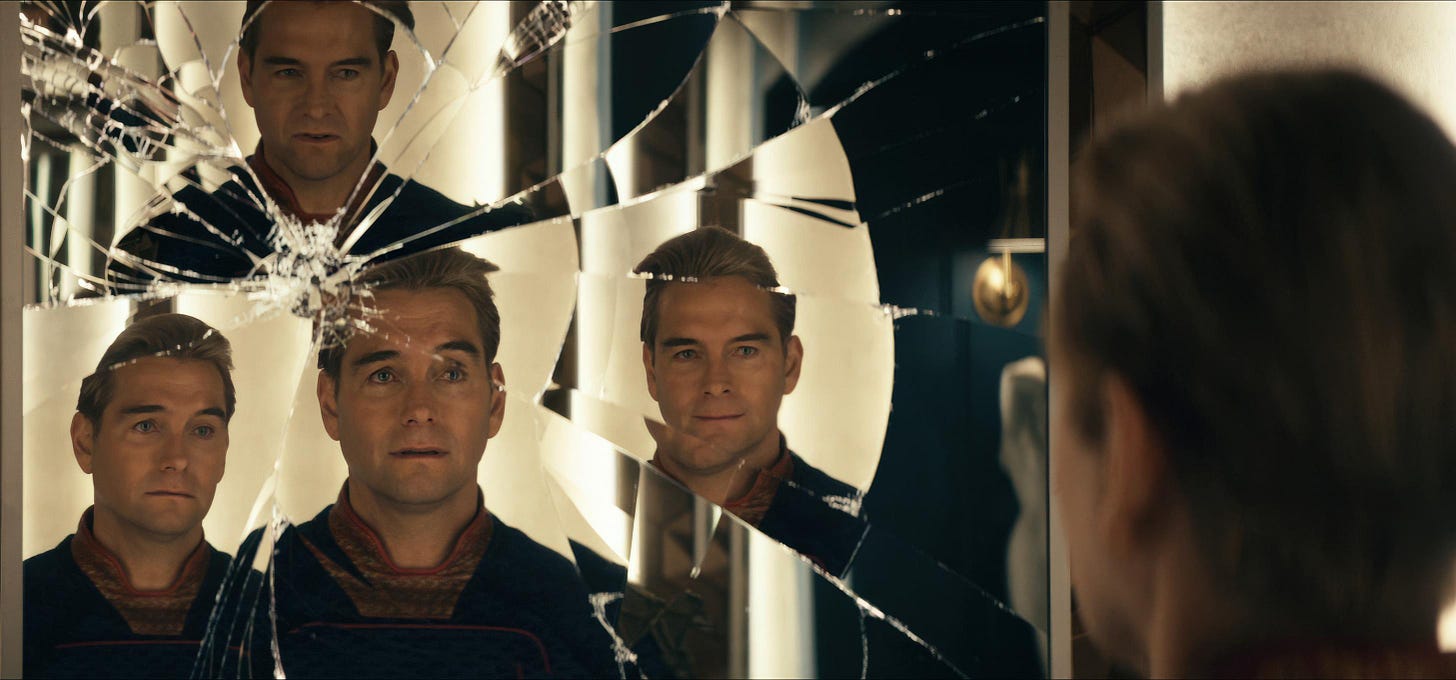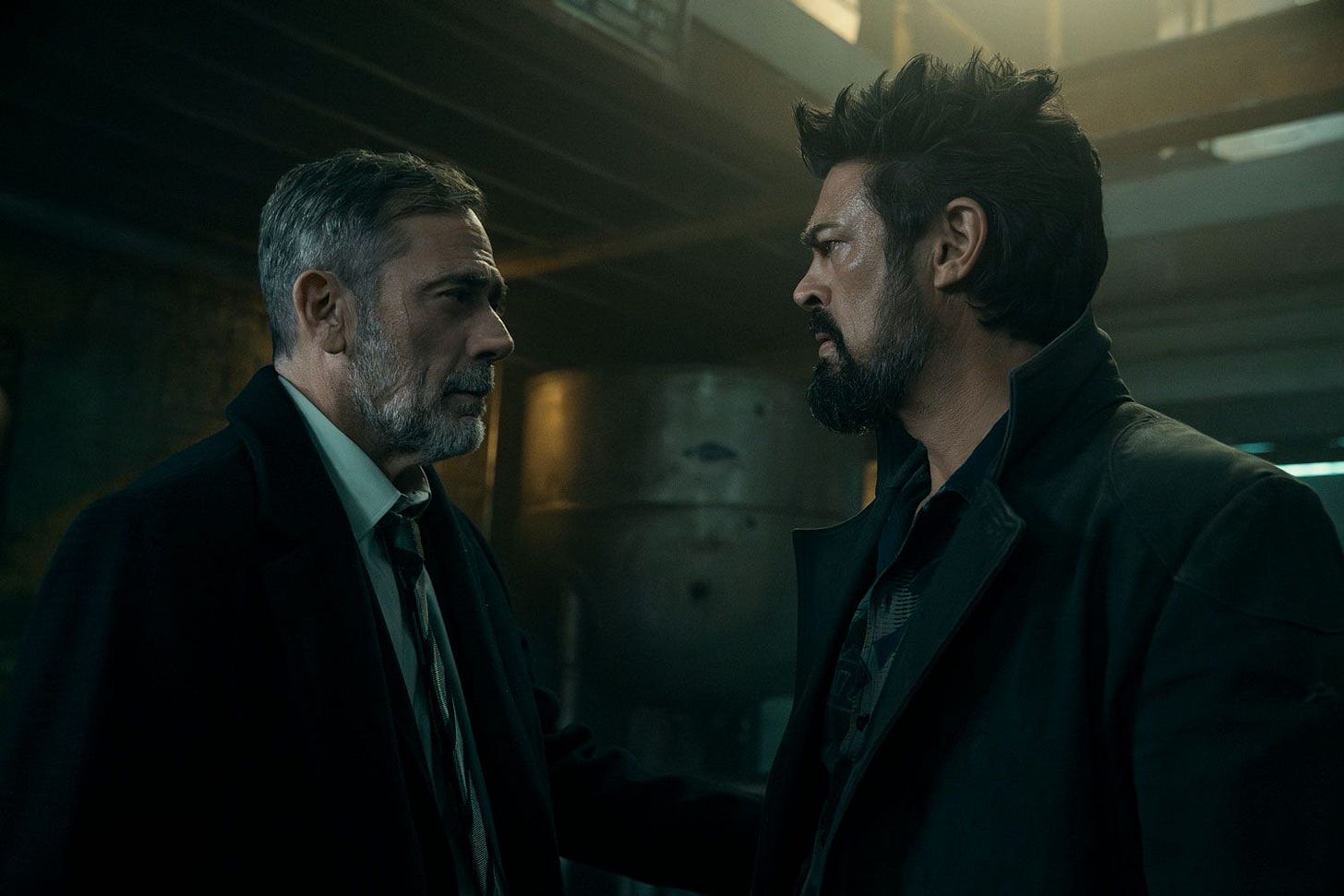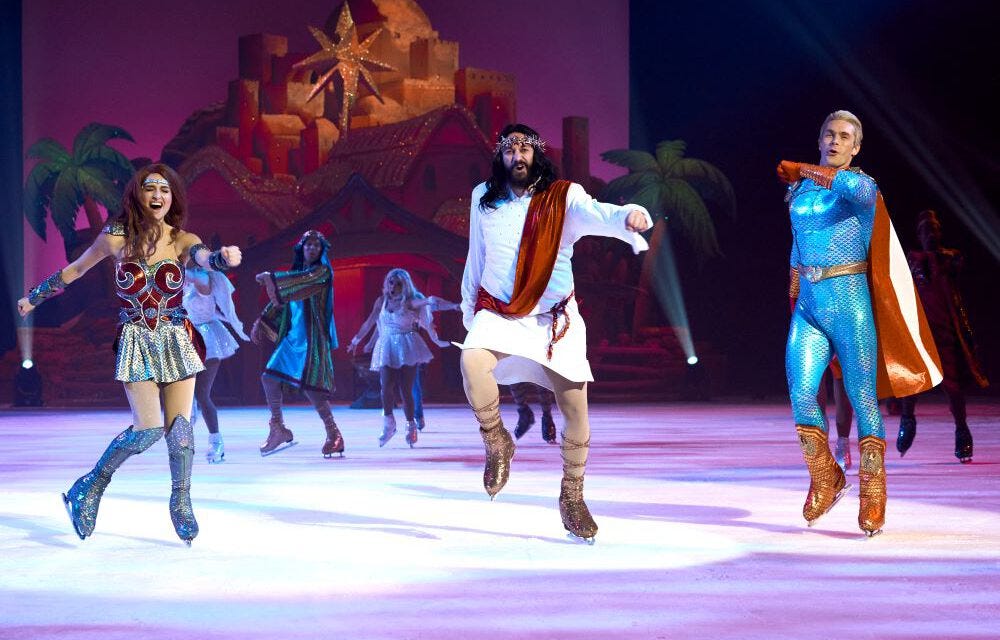Everyone is reckoning with themselves on another dynamic episode of The Boys
A tense web of motivations and secrets continue as “We’ll Keep The Red Flag Flying Here” makes a case for redemption
So, three episodes in, a clear theme has emerged with this season of The Boys: everyone is learning to face their demons and let go of their past. Butcher is cleaning up the mistakes of his past and trying to honor former promises he made; Frenchie must grapple with his brutal history while trying to move forward. Kimiko is avoiding her need to overcome her past by helping others who are facing the same treatment; Hughie is working out his childhood trauma and attempting to find closure with his mom. Annie is trying to shed her past superhero persona and face the consequences of her teenage years; A-Train is making a legitimate effort to redeem himself for his past evils. Ryan is torn between the memory of his mom, his history with Butcher, and his present situation with his new dad; and Homelander is now realizing that he can only move forward if he goes back to his childhood home and faces the trauma and insecurity it caused him. That’s a whole lot of moral exploration to process, and it makes for quite the eventful episode.
A focal point of this episode is Ryan and his two dads’ battle for him. He gets some quality time with Butcher here, and it’s another subplot that sees the writers progressing Billy’s character even further. He continues to be more vulnerable than usual, particularly when he confesses that he pushes away all of the people that he ` because he’s “a bad man”. It doesn’t mean that the character’s rough edges are getting softened, but the choice to confront him with his impending mortality has given Kripke and co. new chances for character progression. I breathed a heavy sigh of relief when he threw out the drug—laced cookies; last season, we saw him constantly screw his team over and make choices that betrayed them, so a choice like this signals true growth. Unfortunately, this puts him at odds with Joe Kessler, who has a great scene towards the end where he insists that Ryan must be trained as a weapon against Homelander, and that the loss of his own son would be worthy in the name of a war against supes. The scenes with him are weighty, and Joe has a great dynamic with Butcher, but I hope Jeffrey Dean Morgan is used more in the latter half of the season. He has such a charismatic, scene-stealing presence that it feels criminal to use him so sparingly thus far.
I haven’t highlighted Cameron Crovetti’s performance yet, even though he’s consistently done very good work in this role, especially since child actors can be hit-or-miss. This season has given him more room than ever to show off his chops, and he’s really selling Ryan’s desperation for a parental figure and how emotionally torn he is between his two fathers. As we see Butcher’s humanity come out, and his relationship with Ryan finally becomes honest, it’s an effective juxtaposition between his fracturing relationship with Homelander. In this episode, he continues to expose Ryan to the flash and glamor of corporate life without any understanding of what Ryan actually wants. Homelander’s thinking is simply that Ryan wants the notoriety and widespread acceptance that he never got as a child, while Ryan just wants love and understanding that has been missing since he lost his mother (in the scene where Homelander yells at Ryan, there’s a great touch where he says “I have given you everything that I have ever wanted!”, which again displays how he’s servicing what he has always longed for rather than what Ryan actually craves).
But Homelander also lacked that love and understanding throughout his life, which creates his emotionally stunted and unaware thinking. We saw a glimpse of this internal struggle in last season’s stellar mirror scene, where he breaks down the child-like, very human need for love that he believes is choking his power, all executed with some of Antony Starr’s most versatile acting that calls to mind Willem Dafoe’s work as the Green Goblin. The motif is resurrected here with the same general theme, along with a few more personalities to boot. It’s another stunner of a scene, from the visuals of the cracked mirror, to the sound design of Homelander’s multiple personalities battling for control, and to Starr’s range; he plays his angered side, frustrated side, and his sensitive side all at once while blending them into one mental breakdown. It serves as yet another introspection into Homelander’s fundamental, very human flaw, and as the episode’s ending, it teases a promising development for the next episode. Homelander’s past has always been hinted at and verbally described, so having him return to his old lab and confront his demons sounds both exciting and heartbreaking for his character.
As for the rest of The Seven, Firecracker and Sage continue to be standouts this season. Homelander officially announces Sage as part of the team and even grants her a new costume, which Sage disapproves of because, as she says, “it’s harder to stage a coup with a million eyes on me”. I like her response to being thrust into the spotlight and how clearly out of place she feels on such a huge stage. Her hyper-intelligent plotting continues to be an interesting source of tension with the rest of the characters (I also like how she repeatedly corrects everyone who calls her the world’s “smartest woman” rather than the “smartest person”), and these interactions lead to an unexpected scene where she gets intimate with The Deep while eating junk food and watching reality TV. For anyone wondering what that bloody rod was about at the end, it seems that she had given herself a lobotomy to dumb herself down as a reprieve from her intelligence. I’m guessing this is a relaxation method that lets her do things that she would never even consider in her previous form, such as The Deep.
We get some very fun meetings with The Seven in this episode, where we find out that the new Noir is narcoleptic, Ryan still hates being in The Seven, Firecracker would do anything (anything) for Homelander, and that Ashley has been demoted. She gets a brief scene where she considers finally quitting Vought, which culminates in the line “Who wants their balls crushed?” because of course that’s how Ashley makes herself feel empowered. This is short-lived, though, once she accompanies Homelander and Sage on their pursuit of whoever leaked the riot video to Starlight. Once Anika, a worker in crime analytics, starts to explain herself, Homelander promptly lasers her head off; the moment worked very well to remind us that Homelander is still a source of danger, and that shocking violence can occur in any room he’s in, but it ultimately crushes Ashley’s hopes for escape. I have an inkling that Ashley could turn on Vought this season, and she could wind up helping The Boys in a semi-redemption arc along with A-Train.
Speaking of whom, A-Train continues to prove himself as one of the season’s best characters. As sole leader of The Boys, MM is intent on flipping him against the wishes of Hughie and Starlight. This seems like a shaky, overly controlling idea until we get to his first interaction with A-Train. Their scene has some great pieces of dialogue that reveals how MM sees the regret and hope within A-Train, while A-Train subtly discloses his fatigue with the superhero life without much dialogue. Because the two of them share an identity as black men, it allows moments of MM prodding A-Train about how he has sacrificed much of his own integrity to appeal to white audiences. It ends with A-Train predictably rejecting him until he reappears to save Hughie from Homelander’s wrath later in the episode. That inner struggle within A-Train is finally paying off in unexpected ways, as that rescue holds a lot of dramatic significance. After all, his conflict with Hughie is what kicked off this whole show, and after four seasons, the writers are allowing him to atone for that.
The last member of The Seven worth discussing is Firecracker, as well as her backstory with Starlight. In my discussion of the last episode, I wrote about how I appreciated that she got more layers to her motivation beyond just simply being a crazy conspiracy theorist. They continued that calculated personality here (while also permitting the writers to get in some funny digs on anti-vaxxers), but she’s given a face-to-face confrontation with Starlight, in which she reveals her hatred of her stems from a childhood rumor at a beauty pageant and the damage it ultimately did to her reputation. At first, I thought spreading such a cruel rumor was out-of-character for Annie, but it does fit in with how she was raised by her mother and the cutthroat environment she was thrust into. This reveal gives Annie an arc that centers around her own flaws and nastiness, something we haven’t seen much of on the show, and it fits in with the season’s overarching theme of having to pay for the mistakes of your past. Her rivalry with Firecracker is a fresh dynamic for her, and I’m sure it will only continue to boil over as the episodes continue.
Moving forward, the Vought on Ice show was yet another creative backdrop for a set piece. The level of choreography and production design that goes into these fake productions is a commendable part of the show, and the writers will never pass up an opportunity to poke fun at conservatives and their attempts to wage war on “Happy holidays” replacing “Merry Christmas”. I’m sure that “Let’s Put The Christ Back In Christmas” was stuck in every fan’s head after watching the episode (maybe it wasn’t the lyrical masterpiece that was last season’s “You’ve Got a License to Drive (Me Crazy)”, but I digress). What begins as a sneaky attempt for intel turns into Homelander chasing Hughie down air ducts and corridors in an animalistic attempt to kill him. It makes sense why Hughie is able to escape (they established back in season 1 that Homelander can’t see through zinc), but Homelander’s laser beams and snarls of rage remind us of how scary he can be when he’s wrathful (if any of you really needed a reminder). Plus, it leads to another bloody mishap involving those poor performers, who either get accidentally split in half by Homelander’s lasers or have their limbs severed by ice skates in a hilariously brutal fashion.
We check up on Hughie again, and we finally get an explanation from his mom. Though the writers don’t try to excuse her abandonment, they give her a sympathetic explanation about how she was coping with post-partum depression, which led her to a suicide attempt that prompted her to leave her family. The reveal finally gives this subplot the emotional depth that it needed, and though she can never fully redeem herself for leaving her family, her slow reconciliation with Hughie could work as a new development for him. I also appreciate that we’re getting a male protagonist with mommy issues rather than daddy issues, as the latter is an overused way for writers to define male trauma now (even if it can still work, like with the current running through Butcher, Soldier Boy, Homelander, and Ryan on this show).
Finally, we circle back to Kimiko and Frenchie’s arcs. The Colin character is still a bit bland, but we’ve never seen such a dark exploration of Frenchie that explores just how brutal he was forced to be, which makes me all the more excited for his confession to Colin. As for Kimiko, I liked the aspect of her backstory that she’s delving into, and Karen Fukuhara is as effective as ever at communicating her emotions without dialogue. I remain steadfastly tired of sequences where the joke is “characters hallucinate while high”, even if this one had some creative visuals (I did like the Barry-esque hallucination of Frenchie seeing all of his victims). However, I like how both of their haunts is driving a wedge between Frenchie and Kimiko, and the action sequence inside the Shining Light facility was fun enough that I’m intrigued to see where else this subplot will go and how Kimiko’s relationship to that girl will change her mission.
Thus far, the season seems to be taking a more character-centric approach than the last season, which began with an introduction of new plot devices and clear missions. Though I do think that season got off to a better start, I am enjoying this deeper look into our characters and the exploration of the dark state of The Boys’ universe. The themes are running strong throughout these episodes, and I can only imagine that they are all building to an explosive payoff soon, much like it did in season 2. The satire is also as sharp as ever in these episodes, with a sequence parodying the Pizzagate fiasco and lines such as “critical supe theory” continuing the show’s spoof of America’s political climate. My biggest surprise thus far is with Neuman’s character; though she does appear in this episode, I’m surprised there hasn’t been more focus on her throughout these two episodes. I thought she would be angled as this season’s big bad to be taken down, but I’m guessing the writers have a (brace for it) mind-blowing plan for her up their sleeves. As for now, I’m just sitting back and enjoying the chaos unfolding in front of me.
Grade: A-
Stray Observations
Sorry about the odd timing of these recaps; finals season was hitting me hard. Now that those are over, these should start coming out much closer to the actual episodes.
I like how The Seven, and especially Homelander, are reacting to the new Black Noir. His confusion and constant speaking serves to continuously distance Homelander from the one person he liked, and it demonstrates the rest of the team’s respect and attempts to honor the original version by trying to make him more accurate.
Fun fact 3: The new Black Noir is actually played by the same actor who played the original. But because his face was never shown and he never spoke, actor Nathan Mitchell gets to continue the role while finally getting to show off a more obvious personality.
Simon Pegg is still comatose. I hope nothing bad happens to Simon Pegg.
The title, “We’ll Keep The Red Flag Flying Here”, is a lyric from the Billy Bragg song “The Red Flag”. The song is about socialism and is often used in regards to workers’ rights, which fits with the show’s overall critiques of capitalism and the a-holes in power.
After a few seasons of Starlight’s power seeming a bit lackluster, I appreciate that she’s getting an upgrade with her ability to fly. She finally can be more threatening than just glowing her eyes time and time again.





